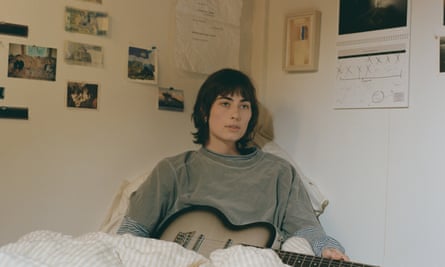For Claire Rousay, a bed can be a studio, a sanctuary and a suffocating cocoon. On the cover of her exquisitely sad new experimental pop album Sentiment, she is seen huddled under the covers, blankly staring at the camera. On her current tour, she is recreating on stage the various bedrooms where she made the record, complete with 16ft walls, a poster of avant garde hero Arthur Russell and, at the centre, a bed. When we speak via a video call in March, Rousay is sitting cross-legged on her mattress in a striped T-shirt, the Los Angeles sun providing a gauzy glow through the window.
“The bed has been very central to me throughout the last couple years of making music. I’ll even mix tracks in it,” she says. “I’m also just so depressed, all the time. So I’m in bed a lot.” She smiles and lets out a small laugh, dulling the sting of her candour; no matter how bleak the conversation gets, she maintains a dry, mischievous wit. Some days, she adds, she’ll pull her blackout curtains down at around noon and stay in bed until the following morning. “It’s comforting but also enabling. My therapist says it’s an unhealthy coping mechanism.”
Over the past few years, Rousay has drawn accolades from the likes of the New York Times and NPR for her largely wordless ambient music, which incorporates intimate personal recordings into its affecting sound collages. She called the style “emo ambient”. Sentiment, her first album for adventurous Chicago label Thrill Jockey, is more like ambient emo: strings, synths and recordings of everyday life gracefully slide to the background as Rousay’s heavily AutoTuned singing and simple guitar playing take centre stage. Of her vocal style, she says, “I’m really into Young Thug and Sparklehorse, so I was like, how can I make both of these sounds at once?” The record’s lyrical concerns include sorrowful sex, drunken regret and biting self-pity. The overall effect is like hearing a hungover android pouring its metal heart out as it floats through space.

Sentiment begins with a stark spoken-word introduction that Rousay wrote on her phone, also in bed, at a particularly low point. “It’s 4pm on a Monday, and I cannot stop sobbing,” it starts, and goes on to offer a deadpan self-analysis of her depressive state, filled with angst, frustration and, ultimately, a sense of gratitude that she is able to feel anything at all. The track ends with an abrupt rattling sound that lasts more than a minute. “It’s like an amplified version of the buzzing of your phone alarm on a very hard surface,” says Rousay. “Just that loop where you’re waking up to your fucking dismal life.” She laughs again, tipping over on to the sheets. The album steps forward from there, tentative and exposed.
Rousay came of age in an evangelical Christian community in San Antonio, Texas. She started playing drums in her church’s worship band, dedicating about 40 hours a week to an endless schedule of practices and performances. She eventually broke with the church’s orthodoxy, specifically questioning its prohibitive sexual mores. Considering rules against premarital sex, Rousay remembers thinking, “What if I blow this skater boy in my high school? Is that OK? That’s not sex, technically.” She smirks and puts her finger on her chin, as if pondering the matter. “And lines especially get blurred when you’re looking at gender and sexuality on a spectrum. I started to unravel all of that.” In 2019, after years of drumming in unsuccessful indie rock and emo bands, Rousay came out as transgender and began releasing music under her own name.
after newsletter promotion

She started working on the material that would become Sentiment amid the loneliness of the pandemic – which also coincided with the end of a six-year relationship – sitting on her bed in San Antonio and drinking Coors Lights. She tried dating apps for the first time. It didn’t go well. She met up with well-adjusted people who made her feel like a mess and others who were “fucking batshit”. Recalling one memorable encounter, she remembers thinking, “Oh my God, I met you three seconds ago and you want to do cocaine and then go to this party? It’s 5pm, doing cocaine when there’s sunlight out is a bad idea.” Her eyes get a little wild. “Dating apps are terrifying.”
In May 2021, Rousay went on a five-day trip and came back to a completely empty house. Burglars had taken everything: $20,000 worth of music gear, couch, passport, bed. Even the toilet seat. A GoFundMe was posted to help her recoup, raising more than $33,000. Soon after, a mysterious box bigger than her car showed up at the friend’s house where Rousay was staying. It was filled with instruments and equipment, including a full drum set and a $5,500 archtop guitar, courtesy of Wilco’s Jeff Tweedy, a fan of her work who had heard about her misfortune. “I did not know him, but he really helped me out when I was fucked,” says Rousay, who has since supported and collaborated with Tweedy. “The shipping on that must’ve been insane. All of the instruments on this record are from Jeff.”
Rousay now shares a place with her current partner in LA, where she has lived for the past couple of years. Even though she is about to release what could be a breakthrough, and is booked to play a cross-continental tour this spring, she admits she’s been acutely depressed of late: brain chemistry does not abide by album rollout plans. So she is making an effort to go for walks. Read voraciously. Take baths. Go to therapy. She is keeping up with her prescriptions, and Rousay jokes that she thought about doing this interview from her pharmacy because she’s “there all the fucking time”.
The potential for her emotionally upfront new album to create a closer bond with listeners has brought her some relief, too. “There’s a way to connect to this music differently than anything else I’ve done,” she says of Sentiment. “There is the possibility that somebody could sing along to it, and that feels good.”
Source: theguardian.com


